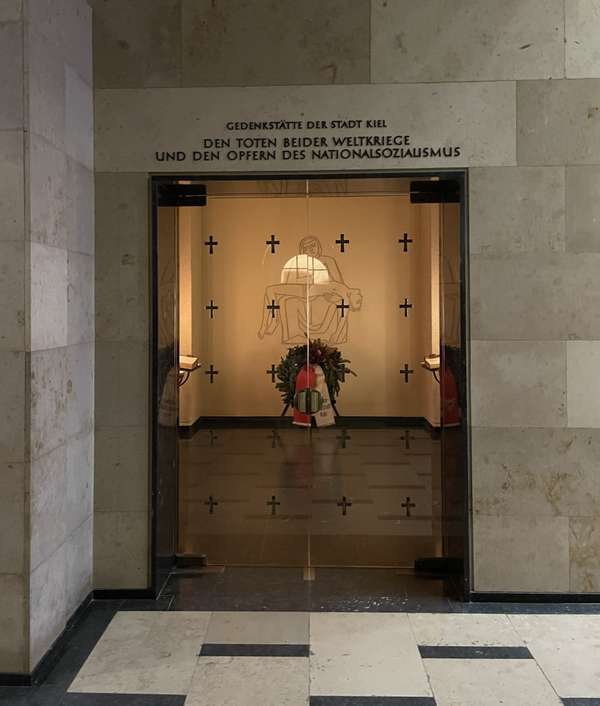Remembrance Day and Sunday of Commemoration of the Dead - Days of Remembrance
- 19. November 2022 - Germany, Holiday
The golden October is over. The holiday season has not yet begun. Fall has arrived with rainy showers and the first storms of the year.
However, November has always been known as the "Month of Mourning" or even the "Month of Remembrance" not because of the weather. The Sunday of the dead, All Saints' Day, All Souls' Day or also the People's Day of Mourning fall in this month. On these days, the deceased are remembered, which is why they are also called silent holidays.
People’s Day of Mourning (or Remembrance Sunday)
After All Saints' Day and All Souls' Day on November 1 and 2, Memorial Sunday is always celebrated as a "silent holiday" two Sundays before the first Advent. On this day, the dead of the world wars and victims of tyranny of all nations are commemorated. Dancing and music events are only permitted with restrictions, and all flags on public buildings fly at half-mast.
The Volksbund Deutsche Kriegsgräberfürsorge (German War Graves Commission), founded in 1919, introduced Remembrance Sunday at the suggestion of its Bavarian state association to commemorate the war dead of the First World War.
The motive behind the introduction of this day was not to "command" mourning. Rather, the Volksbund Deutsche Kriegsgräberfürsorge (German War Graves Commission) wanted to send a signal of solidarity. Those who had no loss to mourn grieved together with the bereaved families of the fallen, thus giving each other support.
In 1922, the first official ceremony took place in the German Reichstag in Berlin.
After the National Socialists took power, they decreed by law in 1934 that the Volkstrauertag (Memorial or Remembrance Sunday) would henceforth be a state holiday and called it "Heldengedenktag" (Heroes' Day of Remembrance). Until 1945, the sponsors were the Wehrmacht and the NSDAP.
Only after the Federal Republic of Germany was founded in 1949, the War Graves Commission again introduced the Volkstrauertag, which was celebrated for the first time in 1950 with a ceremony in the plenary hall of the German Bundestag (parlament), in addition to many regional events.
The federal government, the states and the major religious communities agreed that the date should henceforth be the penultimate Sunday in the Protestant church year and the 33rd Sunday in the Catholic church year. State laws protect the Volkstrauertag.
Due to an increasing distance to the two world wars, the Volksbund understands the Volkstrauertag today as a day of mourning. However, it has also become a day of admonition for reconciliation, understanding and peace.
The Day of National Mourning is celebrated all over the world by the German embassies and foreign communities as well as the Volksbund field offices at German war gravesites.
Sunday of Commemoration of the Dead
Totensonntag (Sunday of Commemoration of the Dead) is a Protestant day of remembrance for the deceased and always takes place on the last Sunday before the first Advent. It is the last Sunday of the Protestant church year.
The church itself does not speak of the Totensonntag, but of Eternity Sunday. Thus, it refers to the belief in the resurrection and eternal life.
According to the Protestant Church, Eternity Sunday is said to have had its origins in the Reformation. It was King Frederick William III of Prussia who finally proclaimed it as the Sunday of the Dead.
The wars of liberation against Napoleon resulted in terrible losses. Therefore, from 1816 on, the deceased were to be commemorated every Sunday before the first Advent. Many regional churches then followed this example.
Today, on Eternity Sunday, the names of people who died in the previous year are mentioned in church. Many Christians visit the graves of their loved ones on Totensonntag and decorate them with ceremonial place settings and wreaths. For Protestants, the day thus has a very similar significance to All Souls' Day on November 2 for the Catholic Church.
Sunday of the Dead is not a public holiday. However, just like Volkstrauertag, it is specially protected in all German states. The holiday laws have designated Totensonntag as a day of mourning and remembrance, for which special restrictions apply. For example, no music events may be held in restaurants.


0 comments